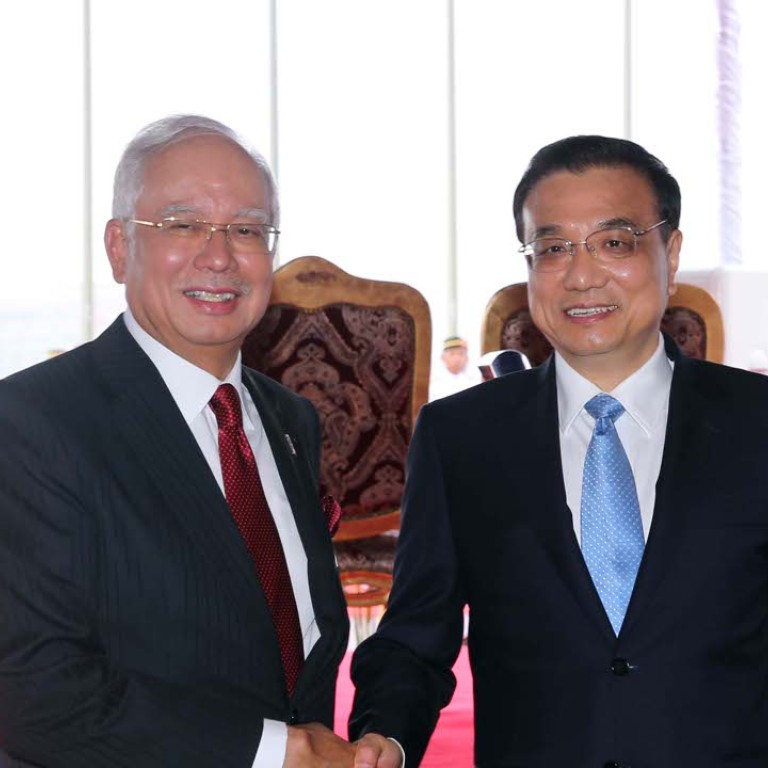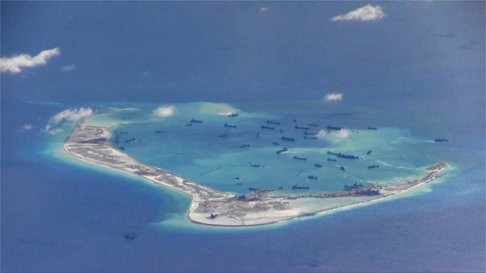
China offers economic perks to Malaysia as it tries to ease tensions over South China Sea
Premier Li Keqiang offered Malaysia a string of economic perks as he wrapped up a four-day trip to smooth tensions in the South China Sea on Monday.
China would buy more of Malaysia’s treasury bonds, give it a 50 billion yuan (HK$60.6 billion) quota to invest in the Chinese capital market, and help build cheaper infrastructure, Li told business elites in Kuala Lumpur.
“Uncertainties in international financial markets are emerging, some countries … have seen sluggish or negative growth, high inflation rates and sharp depreciation of their currency,” the premier said.
“To ensure steady growth in trade relations between China and Malaysia, it is imperative to stabilise the financial market.”
Read more: PLA Navy gains use of port in Malaysia close to Spratly islands
Malaysia’s economy has suffered from a sinking currency and a slump in exports, and a corruption scandal surrounding Malaysian Prime Minister Najib Razak has dimmed investors’ confidence in the country’s leadership.
Over in China, the mainland stock market underwent a few waves of turbulence in the summer as many questioned Beijing’s ability to manage the country’s economy.
The 50 billion yuan quota will be granted under the Qualified Foreign Institutional Investor scheme, one of the key channels for foreign investment in China.
“The central bank of Malaysia had been looking forward to this, and we are surprised by the huge size of the quota,” said Ong Ka Ting, Malaysia’s economic envoy to China.
The central bank of Malaysia had been looking forward to this, and we are surprised by the huge size of the quota
Li also called for greater cooperation in infrastructure, stressing that China could cut construction costs by providing cheaper materials. Beijing has been pushing to build infrastructure across the region as part of efforts to extend the country’s economic clout. Prior to his official visit yesterday, Li was in the Southeast Asian country to attend a series of regional meetings with the Association of Southeast Asian Nations over the weekend.
Tensions flared during the summits as Beijing and Washington traded barbs over China’s island reclamation projects in the South China Sea.

Li said during the summits that China upheld peace and stability in the busy waterways, and that countries outside the region – an indirect reference to the United States – should avoid stirring tensions in the sea. Malaysia has recently been more vocal about China’s encroachment in the oil-rich region.
To drive home his message, Li visited Malacca, a port city next to the strategically important Strait of Malacca, on Sunday. The narrow strip of water connected to the South China Sea serves as a vital nexus in shipping China’s oil supply and manufacture exports. It was also Ming dynasty seafarer Zheng He’s docking place during his expeditions centuries ago.
At Monday’s business forum, Li called Zheng an “envoy of peace” as his missions were “for resolving differences”.
Read more: South China Sea fears linger despite Beijing’s loan and aid pledges at East Asia Summit
Meanwhile, Asean leaders released a statement expressing concern over the possibility of Beijing’s further militarisation in the South China Sea.
Li also said China was ready to cooperate with Malaysia and other countries to counter terrorism in order to “provide a secure environment for business”.
Malaysia has been a popular transit point for Chinese Uygurs fleeing Xinjiang to Turkey. Rights groups and exiles say they left China to escape its repressive policies, but Beijing says many are on their way to join the Islamic State in Syria. Malaysia has been accused to deporting Uygurs back to China.
Oh Ei-sun, a senior fellow with the S. Rajaratnam School of International Studies in Singapore, said the recent Paris attacks and the execution of a Chinese hostage by Isis gave Malaysia more excuse to deport Uygurs.
